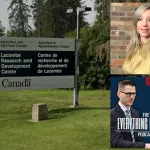
Guest speaker educates on Indigenous history ahead of National Day for Truth and Reconciliation
Truth was the focus of a storytelling session by Patricia Marshall in the days leading up to the National Day for Truth and Reconciliation on September 30.
On September 25, Marshall spoke in the Cornerstone room at Red Deer Polytechnic (RDP) about the historical relationship between Indigenous peoples and the Government of Canada through both research and her own experiences.
“I was hoping for attendees to learn about the whole reason behind truth and reconciliation. What is the truth, and once you know it, how will you reconcile?” she said.
Marshall walked attendees through significant actions that impacted herself and her ancestors, including the signing of the treaties, establishing the reservation system and other restrictions along with it, and the Residential School system.


